
Why we grow heritage seeds
Much of our cultivated biodiversity – including vegetable seeds we grow to eat – has been in decline. Over the last century, we have lost many hundreds of local vegetable varieties, grown for generations by seed companies, families and communities.
Factors adding to this decline include intensive production of a reduced number of species, industrialisation of agriculture and food processing, seed regulations and loss of open-pollinated, traditional varieties.
Why does conserving heritage seed varieties matter?
Preserving history, knowledge and skills
As varieties disappear we lose the rich local history that surrounds the variety, the stories associated with it and the seed savings skills connected to it.
Increasing resilience through diversity
Most significantly, the biodiversity of open-pollinated crops offers an important line of defence in a changing environment.
Plants have a simple way to adapt to different challenges, including climate change: and this is genetic diversity. The more diversity we can find and reintroduce into our food systems the greater our resilience to current and future pressures. In short, open pollinated varieties allow us to grow and develop genetically diverse crops with resistance to pests, diseases and weather conditions.

Getting seed varieties back in use
We believe the best way to conserve is to get heritage varieties back in use. The Heritage Seed Library exists to protect our heritage, and to put these seeds back in the hands of individuals and communities across the UK.
The Heritage Seed Library connects people with seed, keeps our heritage alive and increases biodiversity.